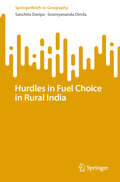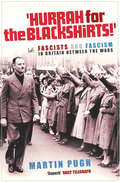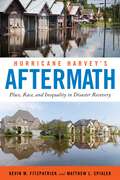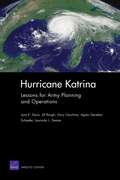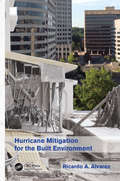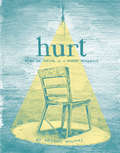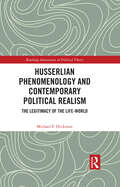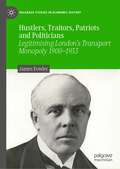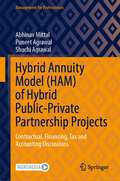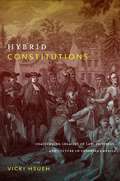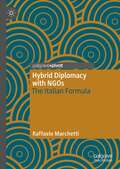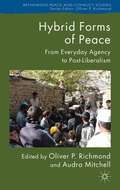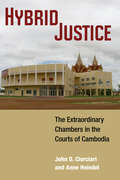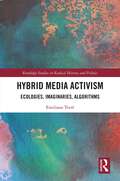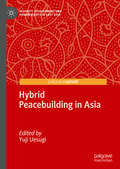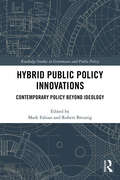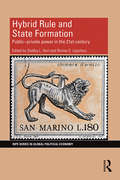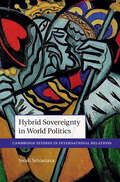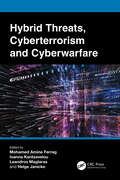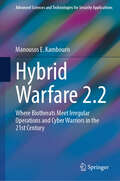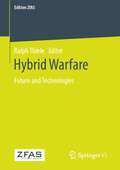- Table View
- List View
Hurdles in Fuel Choice in Rural India (SpringerBriefs in Geography)
by Soumyananda Dinda Sanchita DaripaThis Springer Brief presents a study that aims to identify the demand for cooking fuel at household level under different socio-economic conditions in rural India, with the goal of offering recommendations to reformulate and redesign energy policy. Households’ fuel choice and level of fuel consumption contribute to efforts toward sustainable development in emerging economy like India. In this context, it is important to identify the determining factors of fuel choice and consumption decision for cooking purpose at household level. Earlier studies mainly focused on fuel price and household income determining domestic fuel consumption, and insufficient attention has been given to other socioeconomic factors and decision processes for fuel choice. In this Brief, the double hurdle model is used to estimate the hurdles in fuel demand and its determinants at the household level in rural India.
Hurrah For The Blackshirts!: Fascists and Fascism in Britain Between the Wars
by Martin PughBritain is celebrated for having avoided the extremism, political violence and instability that blighted many European countries between the two world wars. But her success was a closer thing than has been realized. Disillusionment with parliamentary democracy, outbreaks of fascist violence and fears of communist subversion in industry and the Empire ran through the entire period. Fascist organizations may have failed to attract the support they achieved elsewhere but fascist ideas were adopted from top to bottom of society and by men and women in all parts of the country. This book will demonstrate for the first time the true spread and depth of fascist beliefs - and the extent to which they were distinctly British.Rich in anecdotes and extraordinary characters, Hurrah for the Blackshirts! shows us an inter-war Britain on the high-road to fascism but never quite arriving at its destination.
Hurrah Revolutionaries: The Polish Canadian Communist Movement, 1918-1948 (McGill-Queen's Studies in Ethnic History #2)
by Patryk PolecPolish Canadians typically identify themselves as stringent anti-Communists, a label solidified by the legacies of the 1980s Solidarity movement, its founder Lech Walesa, and the widespread anti-Communist riots that helped topple the Communist regime in 1989. Hurrah Revolutionaries challenges this common perception by examining the Polish immigrant community in Canada and the development of radical and traditionally "deviant" ideologies during the interwar period until the end of the Second World War. Patryk Polec unveils a versatile, well-funded, and influential Polish pro-Communist movement with a talented leadership that worked tirelessly to persuade traditionally conservative and religious immigrants to adopt an ideology that was anti-nationalist and atheist. He traces the roots of socialist support in Poland, its transplantation to Canada where the movement enjoyed its greatest support, the challenges the movement faced within an ethnic community influenced by Catholicism, and the complications caused by its links to the Communist International. Polec offers a deeper understanding of the ways in which the Communist Party was able to appeal to certain ethnic groups through cultural outreach as well as its complicated and often counter-productive relationship with the Soviet Union. Grounded in recently declassified Polish consular documents and RCMP surveillance reports, Hurrah Revolutionaries is the first full-length study of Polish Communists in Canada, a group that constituted a substantial portion of the country’s socialist left in the twentieth century.
Hurricane Harvey's Aftermath: Place, Race, and Inequality in Disaster Recovery
by Kevin M. Fitzpatrick Matthew L. SpialekHeartbreaking stories from survivors along the Texas Gulf CoastHurricane Harvey was one of the worst American natural disasters in recorded history. It ravaged the Texas Gulf Coast, and left thousands of people homeless in its wake. In Hurricane Harvey’s Aftermath, Kevin M. Fitzpatrick and Matthew L. Spialek offer first-hand accounts from survivors themselves, providing a rare, on-the-ground perspective of natural disaster recovery. Drawing on interviews from more than 350 survivors, the authors trace the experiences of individuals and their communities, both rich and poor, urban and rural, white, Latinx, and Black, and how they navigated the long and difficult road to recovery after Hurricane Harvey. From Corpus Christi to Galveston, they paint a vivid, compelling picture of heartache and destruction, as well as resilience and recovery, as survivors slowly begin rebuilding their lives and their communities. An emotionally provocative read, Hurricane Harvey’s Aftermath provides insight into how ordinary people experience and persevere through a disaster in an age of environmental vulnerability.
Hurricane Katrina: Lessons for Army Planning and Operations
by Lynn E. Davis Agnes Gereben Schaefer Gary Cecchine Laurinda L. Zeman Jill Rough Laurinda L. RohnThe efforts undertaken by civilian and military organizations in response to Hurricane Katrina were historically unprecedented, but a number of changes would enhance future Army and National Guard disaster-response efforts, including preparing governors to call up Guard units for out-of-state emergencies and the creation of regional standing homeland security task forces.
Hurricane Mitigation for the Built Environment
by Ricardo A. Alvarez"Alvarez drives home the point that for buildings and communities located in hurricane-prone regions, it is not a question of whether the area will be impacted, but when it will be impacted. The book makes a strong case for taking responsibility to understand the vulnerabilities of buildings and structures to hurricane impacts." Timothy Reinhold, P
Hurt: Notes on Torture in a Modern Democracy (Real World Ser.)
by Kristian WilliamsHURT is Portland activist Kristian Williams' collection of articles and interviews on the history, psychology, and current state of torture in democratic societies.<P><P> Williams, author of Our Enemies in Blue and American Methods: Torture and the Logic of Domination, has pulled together a vast and comprehensive resource on this abominable act. Articles include David Cunningham's "Prisons, Torture, and Imperialism," a piece on the anarchist perspective taken from comments at the 2008 Anarchist Bookfair in San Francisco, and a great essay on writing about torture, among many others. This sober 64-page document is a heavy piece of work-dark, informative, and oft times harrowing. But it's also about working hard to intact change. As says Williams in the Gyozo Nehez interview, "At the outset, I think it's more important to have a sense of hope, that things can be different and through our actions we can contribute to that change. The joy comes later, from struggle itself as much as from victory." HURT is a how-to manual on fighting and understanding torture-a piece of the struggle itself.
Husserlian Phenomenology and Contemporary Political Realism: The Legitimacy of the Life-World (Routledge Innovations in Political Theory)
by Michael F. HickmanDrawing on Husserl’s concepts of communalization and intersubjectivity, this book aspires to an orientation in which human beings are understood in the context of their full-blooded, concrete existence – the life-world. Michael F. Hickman offers a fresh return to the raw experience of politics through the contemporary realist idea of radical disagreement as the "circumstances of politics." He surpasses realist limitations through the acknowledgment of the constitution of the world as an achievement of the intersubjective community, while crucially asserting that the political horizon is distinguishable from, but coterminous with, the life-world itself. Through the use of hypotheticals, an unprecedented phenomenological account of political experience is offered, in which three major themes of political subjectivity are explored: belonging and possession, authority, and foreignness and political others. Finally, a multi-phase analysis of legitimacy is conducted which, taking into account universal human rights and concretely identifiable expressions of acceptance, is nonetheless rooted in a source – the life-world – that reaches beyond any mere collectivity of ego-acts. Utilizing an expanded philosophical universe, Husserlian Phenomenology and Contemporary Political Realism offers a path forward from the ideological stalemates in which liberal theory seems hopelessly locked. It will appeal to scholars involved in the study of political theory and philosophy, international relations, intercultural studies, human rights and phenomenology.
Hustlers, Traitors, Patriots and Politicians: Legitimising London’s Transport Monopoly 1900–1933 (Palgrave Studies in Economic History)
by James FowlerThis book offers a novel explanation of the transformation of London’s transport from a free market to a public corporation rooted in social and political legitimacy rather than economic rationality. To become a single corporation London Transport first had to gain a ‘social licence’ to operate, and this book explains how and why. It considers how a revolution in data gathering during this period helped to justify the transition to a central, unified provider, while also investigating how reputational damage to key figures in the transport industry jeopardized the political and social legitimacy needed to manage public corporation on a large scale. The book combines archival research with academic insights from theories of legitimacy, statistical accounting and scientific management to explore how the employment of statistical information combined with skilful media repositioning allowed a new generation of figureheads in the transport business to emerge as honest, professional, and patriotic, making them suitable business leaders of a transport monopoly in London after 1933. This account of events combines the concepts of trust in numbers and trust in character to produce a wide-ranging, qualitative historical account of the creation a major public monopoly. It will be of interest to students and scholars from a wide range of disciplines, including business and management history, transport policy, management and organization studies, public administration and public sector studies.
Hybrid Annuity Model: Contractual, Financing, Tax and Accounting Discussions (Management for Professionals)
by Puneet Agrawal Abhinav Mittal Shuchi AgrawalThis book analyses several aspects of Hybrid Annuity Model (HAM), a form of hybrid public-private partnership (PPP) for development of roads sector in India. The book covers contractual, financing, taxation and accounting aspects of the HAM based PPP projects in India and provides a complete multi-dimensional view for readers. It is a comprehensive guide for multiple stakeholders involved in the development of infrastructure projects in developing economies across globe. The book is authored by professionals having hands-on advisory experience for HAM PPP projects in India. Given that these are long-term concession agreements (around 15 years), there are inherent complications and the authors have tried to provide clarity on practical issues. The book adopts a novel case-study approach. Based on detailed financial and commercial assumptions for a road project in India, the authors have used around 100 numerical illustrations to provide a quantitative and qualitative understanding for readers. Another highlight of the book is use of international case-studies to provide key learnings in areas of project preparation and structuring for such hybrid PPP models. The risk allocation framework is also contrasted with the HAM PPP model to highlight the key differences. The international case studies have been selected from transport and water sector to illustrate the applicability of hybrid PPPs across multiple sectors to support sustainable infrastructure development. The target audience for this book include private sector developers, government agencies, deal practitioners, advisors, researchers and academia . This book will also serve as a useful guide for commercial lenders, development finance institutions (DFIs) and institutional investors who are looking to finance such infrastructure projects in the long term.
Hybrid Constitutions: Challenging Legacies of Law, Privilege, and Culture in Colonial America
by Vicki HsuehIn Hybrid Constitutions, Vicki Hsueh contests the idea that early-modern colonial constitutions were part of a uniform process of modernization, conquest, and assimilation. Through detailed analyses of the founding of several seventeenth-century English proprietary colonies in North America, she reveals how diverse constitutional thought and practice were at the time, and how colonial ambitions were advanced through cruelty toward indigenous peoples as well as accommodation of them. Proprietary colonies were governed by individuals (or small groups of individuals) granted colonial charters by the Crown. These proprietors had quasi-sovereign status over their colonies; they were able to draw on and transform English legal and political instruments as they developed constitutions. Hsueh demonstrates that the proprietors cobbled together constitutions based on the terms of their charters and the needs of their settlements. The "hybrid constitutions" they created were often altered based on interactions among the English settlers, other European settlers, and indigenous peoples. Hsueh traces the historical development and theoretical implications of proprietary constitutionalism by examining the founding of the colonies of Maryland, Carolina, and Pennsylvania. She provides close readings of colonial proclamations, executive orders, and assembly statutes, as well as the charter granting Cecilius Calvert the colony of Maryland in 1632; the Fundamental Constitutions of Carolina, adopted in 1669; and the treaties brokered by William Penn and various Lenni Lenape and Susquehannock tribes during the 1680s and 1690s. These founding documents were shaped by ambition, contingency, and limited resources; they reflected an ambiguous and unwieldy colonialism rather than a purposeful, uniform march to modernity. Hsueh concludes by reflecting on hybridity as a rubric for analyzing the historical origins of colonialism and reconsidering contemporary indigenous claims in former settler colonies such as Australia, New Zealand, and the United States.
Hybrid Diplomacy with NGOs: The Italian Formula
by Raffaele MarchettiThis book explores a new way of doing diplomacy through the engagement with non-governmental organizations, here referred to as hybrid diplomacy. Today’s global politics is played out most successfully by the combined actions of different actors. A specific type of partnership is that between governments (namely Ministries of Foreign Affairs) and civil society organizations. While not the only type of global partnership at work, this is particularly effective in advancing new issues and promoting the norm changes that have been discussed at length in international relations and sociological literature. The author has chosen Italy as a case study because of the country's prolonged deployment of such policy. Being a middle power, with a strong non-profit sector, and hosting the central node of catholic global network, Italy is well positioned to take advantage of this new diplomatic mode. Through presenting a new reading of the Italian contribution to international affairs, this book contributes to broadening the scholarship in foreign policy analysis and transnational activism.
Hybrid Forms of Peace
by Oliver P. Richmond Audra MitchellHybrid Forms of Peace provides cutting-edge research and debates from a range of leading experts and emerging voices in critical peace and conflict studies. Drawing on case studies from sixteen countries, it examines the role of everyday activities and hybridization in (re)shaping international peace-building on the ground. This book provides insights into the challenges – and opportunities – of building peace, and the role of localized forms of human agency in this. It is a must-read for scholars, students and practitioners of peace-building who wish to understand the 'on the ground' realities of peacebuilding in the contemporary era.
Hybrid Governance in European Cities
by Chris Skelcher Helen Sullivan Stephen JeffaresThis wide-ranging study of three European cities shows how hybrid forms of governance emerge from the tensions between new ideas and past legacies, and existing institutional arrangements and powerful decision makers. Using detailed studies of migration and neighborhood policy, as well as a novel Q methodology analysis of public administrators.
Hybrid Justice: The Extraordinary Chambers in the Courts of Cambodia
by Anne Heindel John D. CiorciariSince 2006, the United Nations and Cambodian Government have participated in the Extraordinary Chambers in the Courts of Cambodia, a hybrid tribunal created to try key Khmer Rouge officials for crimes of the Pol Pot era. In Hybrid Justice, John D. Ciorciari and Anne Heindel examine the contentious politics behind the tribunal's creation, its flawed legal and institutional design, and the frequent politicized impasses that have undermined its ability to deliver credible and efficient justice and leave a positive legacy. They also draw lessons and principles for future hybrid and international courts and proceedings.
Hybrid Media Activism: Ecologies, Imaginaries, Algorithms (Routledge Studies in Radical History and Politics)
by Emiliano TreréThis book is an extensive investigation of the complexities, ambiguities and shortcomings of contemporary digital activism. The author deconstructs the reductionism of the literature on social movements and communication, proposing a new conceptual vocabulary based on practices, ecologies, imaginaries and algorithms to account for the communicative complexity of protest movements. Drawing on extensive fieldwork on social movements, collectives and political parties in Spain, Italy and Mexico, this book disentangles the hybrid nature of contemporary activism. It shows how activists operate merging the physical and the digital, the human and the non-human, the old and the new, the internal and the external, the corporate and the alternative. The author illustrates the ambivalent character of contemporary digital activism, demonstrating that media imaginaries can be either used to conceal authoritarianism, or to reimagine democracy. The book looks at both side of algorithmic power, shedding light on strategies of repression and propaganda, and scrutinizing manifestations of algorithms as appropriation and resistance. The author analyses the way in which digital activism is not an immediate solution to intricate political problems, and argues that it can only be effective when a set of favourable social, political, and cultural conditions align. Assessing whether digital activism can generate and sustain long-term processes of social and political change, this book will be of interest to students and scholars researching radical politics, social movements, digital activism, political participation and current affairs more generally.
Hybrid Peacebuilding in Asia (Security, Development and Human Rights in East Asia)
by Yuji UesugiThis book explores hybrid peacebuilding in Asia, focusing on local intermediaries bridging the gaps between incumbent governments and insurgents, national leadership and the grassroots constituency, and local stakeholders and international intervenors. The contributors shed light on the functions of rebel gatekeepers in Bangsamoro, the Philippines, and Buddhist Peace monks in Cambodia to illustrate the mechanism of dialogue platforms through which gaps are filled and the nature of hybrid peace is negotiated. The book also discusses the dangers of hybrid peacebuilding by examining the cases of India and Indonesia where national level illiberal peace was achieved at the expense of welfare of minority groups. They suggest a possible role of outsiders in hybrid peacebuilding and mutually beneficial partnership between them and local intermediaries.
Hybrid Public Policy Innovations: Contemporary Policy Beyond Ideology (Routledge Studies in Governance and Public Policy)
by Mark Fabian Robert BreunigPolitical discourse in much of the world remains mired in simplistic ideological dichotomies of market fundamentalism for efficiency versus substantial socialism for equity. Contemporary public policy design is far more sophisticated. It blends market, government and community tools to simultaneously achieve both equity and efficiency. Unlike in the twentieth century, this design is increasingly grounded in a deep evidence base derived by way of rigorous empirical techniques. A new paradigm is emerging: hybrid policies. This volume provides a thorough introduction to this technical side of public policy analysis and development. It demonstrates that it is possible to go beyond ideology, and find there some powerful answers to our most pressing problems. An international team of experts, many of whom have experience with the design or implementation of hybrid policies, helps cover the behavioural, institutional and regulatory theories that inform the choice of policy objectives and lead the initial conception of solutions. They explain the reasons why we need evidence-based public policy and the state-of-the-art empirical techniques involved in its development. And they analyse a range of in-depth case studies from industrial relations to health care to illustrate how hybrids can intermingle the strengths of governments, markets and the community to combat the weaknesses of each and arrive at bipartisan outcomes. Hybrid Public Policy Innovations is geared to scholars and practitioners of public policy administration and management who desire to understand the analytical reasons why policies are designed the way they are, and the purpose of evidence-gathering frameworks attached to policies at implementation.
Hybrid Regimes within Democracies: Fiscal Federalism and Subnational Rentier States
by Carlos GervasoniFrom the racially segregated 'Jim Crow' US South to the many electoral but hardly democratic local regimes in Argentina and other federal democracies, the political rights of citizens around the world are often curtailed by powerful subnational rulers. Hybrid Regimes within Democracies presents the first comprehensive study of democracy and authoritarianism in all the subnational units of a federation. The book focuses on Argentina, but also contains a comparative chapter that considers seven other federations including Germany, Mexico, and the USA. The in-depth and multidimensional description of subnational regimes in all Argentine provinces is complemented with an innovative explanation for the large differences between those that are democratic and those that are 'hybrid', complex combinations of democratic and authoritarian elements. Putting forward and testing an original theory of subnational democracy, Gervasoni extends the rentier-state explanatory logic from resource rents to a more general concept, such as 'fiscal federalism rents', and from the national to the subnational level.
Hybrid Rule and State Formation: Public-Private Power in the 21st Century (RIPE Series in Global Political Economy)
by Shelley Hurt Ronnie LipschutzNeoliberalism has been the reigning ideology of our era. For the past four decades, almost every real-world event of any consequence has been traced to the supposedly omnipresent influence of neoliberalism. Instead, this book argues that states across the world have actually grown in scope and reach. The authors in this volume contest the view that the past three decades have been marked by the diminution of the state in the face of neoliberalism. They argue instead that we are witnessing a new phase of state formation, which revolves around hybrid rule—that is, a more expansive form of state formation that works through privatization and seeks pacification and depoliticization as instrumental to enhancing state power. Contributors argue that that the process of hybridization, and hybrid rule point towards a convergence on a more authoritarian capitalist regime type, possibly, but not necessarily, more closely aligned with the Beijing model—one toward which even the United States, with its penchant for surveillance and discipline, appears to be moving. This volume will shed new light on evolving public-private relations, and the changing nature of power and political authority in the 21st century and will be of interest to students and scholars of IPE, international relations and political theory.
Hybrid Sovereignty in World Politics (Cambridge Studies in International Relations)
by Swati SrivastavaThe idea of 'hybrid sovereignty' describes overlapping relations between public and private actors in important areas of global power, such as contractors fighting international wars, corporations regulating global markets, or governments collaborating with nongovernmental entities to influence foreign elections. This innovative study shows that these connections – sometimes hidden and often poorly understood – underpin the global order, in which power flows without regard to public and private boundaries. Drawing on extensive original archival research, Swati Srivastava reveals the little-known stories of how this hybrid power operated at some of the most important turning points in world history: spreading the British empire, founding the United States, establishing free trade, realizing transnational human rights, and conducting twenty-first century wars. In order to sustain meaningful dialogues about the future of global power and political authority, it is crucial that we begin to understand how hybrid sovereignty emerged and continues to shape international relations.
Hybrid Threats, Cyberterrorism and Cyberwarfare
by Helge Janicke Ioanna Kantzavelou Leandros Maglaras Mohamed Amine FerragNowadays, in Cyberspace there is a burst of information that everyone has access. However, apart from the advantages the Internet offers, it also hides numerous dangers for both people and nations. Cyberspace has a dark side, including terrorism, bullying, and other types of violence. Cyberwarfare is a kind of virtual war that causes the same destruction that a physical war would also do. A hybrid threat is an umbrella term, encompassing a wide variety of existing adverse circumstances and actions, such as terrorism, migration, piracy, corruption, ethnic conflict etc and is not exclusively a tool of asymmetric or non-state actors, but can be applied by state and non-state actors alike. ‘Cyber-conflict’ and ‘cyber-war’ serve as examples of the use of new technologies within the scope of hybrid threats. Cyber-war basically refers to a sustained computer-based cyber-attack by a state against the IT infrastructure of a target state. On the other hand cyber-security is a major factor that shapes productivity and efficiency of the modern industry in both technical and economic terms. The book discusses and analyses current posture of cyberterrorism, cyberwarfare, and hybrid threats, sector specific cyber-attacks that have the form of cyberterrorism and presents the recent actions that EU, USA and other Nations have taken in order to strengthen their systems against such attacks. There has never been a higher risk of a major catastrophe as a result of the rise in offensive cyber activity, particularly the possibility of cyber-physical strikes against critical services. Recent cyber-attacks against critical infrastructures along with the continuous migration crisis have been the main driving forces that led to the decision to publish this book.
Hybrid War: Attack on the West
by Mauro VoerzioDisinformation is a bad virus for Democracies and a vaccine can never be discovered to render it harmless. With the help of everyone, however, we can contain it and make it less effective. The book talks about the techniques used by disinformers, the terminologies that are used every day by journalists and insiders whose meaning is often unknown, disinformation in history, the psychological aspects of disinformation, case studies, objectives that disinformation sets for itself. Disinformation is certainly one of the most important components of the new hybrid wars. A hybrid war is underway against the fundamental values of the West, a hybrid war that aims to collapse the project of the European Union, the largest peace project in history. Recognizing disinformation and disinformers will help us recognize our enemies, those who want to destroy the society we built, with not a few sacrifices, by our grandparents and our parents. As in all wars, in hybrid war, there are generals and soldiers. It is up to us to decide which side of the fence to stand on in this modern call to arms.
Hybrid Warfare 2.2: Where Biothreats Meet Irregular Operations and Cyber Warriors in the 21st Century (Advanced Sciences and Technologies for Security Applications)
by Manousos E. KambourisThe concept of Hybrid Warfare has gained prominence in recent decades. It is a novel terminology, but the concept is detectable since antiquity: Ancient Chinese, Ancient Greeks and the Jews of Exodus were all well familiar, so well to have let us know. Similarly, bioagents have been used malevolently since always. What is novel is that these two, in the present context, are not only interfacing smoothly, but in an enhanced context: The Hybrid Warfare, which has now enriched its portfolio, from actions of provocation, insurgency, economic warfare, special operations, proxy warfare and social destabilization to the Residual domain, the cyberspace, while the conventional, 3D space expands. Now the Space and the Deep are included in the topography of the friction zone. In this, the bio- factor becomes not only relevant but also an amplifier: using the technology malevolently, all the advances made to combat disease may be used to cause, further, or perplex and complicate disease. Improved or totally novel or even alien germs may replace explosives in bombs, shells or suicidal /kamimaze drones and taint bullets and fragments. Microrobots may deliver cancer cells to targeted individuals to foster cancer, or specific supergerms for an infection to rage unchallenged. And what happens if the mechanism of these cancers and infections is intentionally provided with an Abort signal? Global extortions would become probable, not just possible. Far from Science Fiction, this dystopia becomes more probable by the day. The Artificial Intelligence simply makes it easier to occur. Technology allows manipulation and intervention in levels and extends only imagined in the Past, but the application of these capabilities is clearly of dual use, with the destructive potential leveraged by the complexity of the social and state structure. Within this book, we explore the “How” (occasionally the “What” also) in some of these instances. From cyber terrorists to aggressive bioindustrialists and “democratized” ballistic and cruise missile technology, it could be coined as "The Book of Modern Mayhem”.
Hybrid Warfare: Future and Technologies (Edition ZfAS)
by Ralph ThieleHybrid warfare is becoming a long-term strategic challenge for NATO and the EU. This book examines its conceptual foundations, actors and technologies from a holistic, systemic perspective. In particular, new, disruptive technologies have a catalytic effect on hybrid methods and tools. 19 Technologies prove to be particularly relevant. They improve the initial conditions for hybrid action, expand the arsenal of hybrid actors and improve the scope and prospects for success of their activities.
